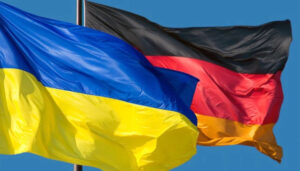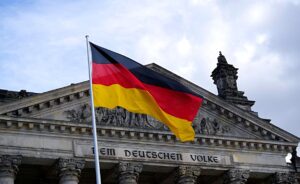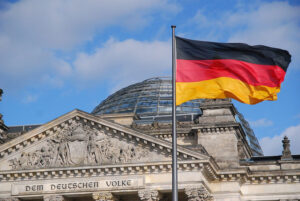

Germany is one of the countries that enjoy the greatest trust and sympathy among Ukrainians. This is evidenced by the results of an all-Ukrainian survey conducted by Active Group in cooperation with the Experts Club information and analytical center in August 2025.
According to the survey, 76.7% of Ukrainian citizens have a positive attitude toward Germany (51.3% are mostly positive, 25.3% are completely positive). Only 4.0% of respondents expressed a negative attitude (3.3% – mostly negative, 0.7% – completely negative). Another 18.7% of Ukrainians are neutral, and 1.0% admitted that they do not know enough about this country.
“For Ukrainians, Germany is first and foremost a guarantor of stability in the European Union, a country that made a huge contribution to supporting Ukraine during the war. At the same time, economic cooperation is also essential: in the first half of 2025, bilateral trade exceeded $5.63 billion, of which Ukrainian exports amounted to $1.58 billion and imports from Germany exceeded $4.05 billion. The negative balance of about $2.5 billion demonstrates that we import more than we export, but this reflects the high demand for German technology and equipment,” said Maksym Urakin, founder of Experts Club.

In turn, Oleksandr Poznyi, co-founder of Active Group, emphasized that the positive attitude of Ukrainians goes far beyond the economy.
“Germany is viewed as a strategic ally in the political and security dimensions. Hundreds of thousands of Ukrainian refugees have found refuge there, and large-scale financial and military assistance plays a key role in the stability of our country. The combination of these factors explains why more than three-quarters of Ukrainians have a positive attitude towards Germany and why this country remains among the absolute leaders of trust in our society,” he added.
The survey was part of a broader study of international sympathies and antipathies of Ukrainians in the current geopolitical context.
The full video is available here:
https://www.youtube.com/watch?v=YgC9TPnMoMI&t
You can subscribe to the Experts Club YouTube channel here:
https://www.youtube.com/@ExpertsClub
ACTIVE GROUP, DIPLOMACY, EXPERTS CLUB, GERMANY, Poznyi, SOCIOLOGY, TRADE, URAKIN

The total volume of German exports, adjusted for calendar and seasonal factors, fell by 0.6% in July compared to the previous month, to €130.2 billion, according to a report by the Federal Statistical Office of Germany (Destatis). Imports decreased by 0.1% to €115.4 billion.
Year-on-year, exports grew by 1.4% and imports by 4.3%.
Exports to the US in July fell by 7.9% compared to June, to their lowest level since December 2021. This is the fourth consecutive month of decline. Shipments to China fell by 7.3%, and to the UK by 3.1%. Exports to European Union countries increased by 2.5%, while exports to Russia fell by 12.4% (to €526.5 million, a drop of 19.8% compared to July 2024).
Imports from EU countries rose by 1.1% last month, and from the UK by 7.8%. Supplies from China fell by 2.4%, from the US by 10%, and from Russia by 43.9% (to €80.7 million, a drop of 40.3% compared to a year earlier).
In January-July, exports from Germany to Russia fell by 6.8% compared to the same period last year, while imports fell by 37.4%.
Germany’s foreign trade surplus fell to €14.7 billion in July from €15.4 billion in June. A year earlier, the surplus was €17.7 billion.
Source: http://relocation.com.ua/nimechchyna-v-lypni-skorotyla-eksport-do-ssha/

Germany is losing industrial jobs at an accelerated rate – and this is no longer a localized slump, but a steady trend. According to a fresh study by EY, the industry cut employment by 2.1% over the year, with the auto industry losing about 51,500 jobs (-6.7% year-on-year). Weak demand, expensive energy, competition from Asia, US duties and the expensive transition to electric vehicles are squeezing margins and forcing concerns to optimize staffing levels. In Q2 2025, industry revenue fell 2.1% YoY to €533bn, continuing a series of quarterly declines.
Structurally, the auto sector was the hardest hit, but contractions are also evident in mechanical engineering and metals, while chemicals and pharma are showing relative stability, as evidenced by both public excerpts from the EY barometer and industry commentary in the German business press. In aggregate, German industry has shed around a quarter of a million jobs since 2019, reflecting the cumulative effect of several consecutive shocks.
Operational metrics point to a sluggish cycle, with new orders in manufacturing falling in June and annualized turnover declining; this combination usually signifies weakness over the horizon of the coming quarters, even if individual months produce technical bounces in production. At the macro level, this is combined with a fall in GDP in Q2 and a downward revision of the dynamics of the beginning of the year.
The political backdrop has become tougher, with Chancellor Friedrich Merz openly stating that the current welfare state model is “unfundable” without reforms, signaling a possible shift in budget priorities in favor of incentives for employment and industrial competitiveness. For business, this means less room for “inertia” subsidies and more pressure on productivity, R&D and export adaptation.
What this means for companies and the labor market. Automakers and their supply chain will likely face a second wave of restructuring to accommodate the EV economy and US tariff geopolitics; engineering will continue to lose low-margin positions to Asian competitors, and growth will shift to high-engineering value-added niches. For chemicals and pharma, the window of resilience is preserved through contractual models and pricing power, but energy-intensive segments remain vulnerable to spot gas and electricity disruptions. The labor market will be “two-speed”: release on the assembly line and in basic metalworking in parallel with a shortage of specialists in automation, electronics, software, battery technologies and chemical technologies – this is already evident in the structure of vacancies and industry surveys.
Conclusion. The job cuts are not the “end of industry” but a painful realignment: Germany is losing mass jobs where it is losing out on costs and is trying to retain and grow employment in capital- and knowledge-intensive segments. The key to a turnaround is cheaper energy, faster permitting procedures, prioritization of industrial investments and retraining for the electric and digital agenda. In the meantime, order and turnover statistics signal that the bottom of the cycle has not yet been passed.
https://t.me/relocationrs/1332

Unemployment in the eurozone stood at 6.2% in June, according to the European Union’s statistical office. In May, according to the revised data, it was also at 6.2%, not 6.3%, as previously reported. Analysts on average expected unemployment to remain at the previously announced May level, according to Trading Economics.
For comparison, in June 2024, the unemployment rate was 6.4%.
Unemployment was at a record low of 6.2% in October and November 2024, then rose, and in April fell again to the lowest level on record.
In June, the number of unemployed in the euro area decreased by 62 thousand compared to the previous month, to 10.7 million people.
The share of unemployed youth (population under 25) fell to 14.1% from 14.3%.
The lowest unemployment rate among the largest eurozone countries was recorded in Germany (3.7%), and the highest in Spain (10.4%).
In the European Union, unemployment remained at 5.9% in June. In the same month of 2024, it was 6%.

Ukraine exported 24.406 thousand tons of honey in January-June 2025, which is 1.9 times less than in the same period of 2024, when 48.113 thousand tons of this product was supplied to foreign markets. According to statistics released by the State Customs Service (SCS), revenue from honey sales for the period amounted to $53.261 million, which is 41.7% less than for the same period last year, when revenue amounted to $91.417 million.
The top three importers of Ukrainian honey in January-June 2025 were Germany, which accounted for 22.86% of purchases worth $12.177 million, Spain – 10.83% and $5.769 million respectively, Poland – 9.77% and $5.2 million respectively.
A year earlier, during the same period, the most active importers of sugar from Ukraine were Germany (25.76% at $23.546 million) and Poland (10.16% at $9.288 million), as well as the United States (15.27% at $13.955 million).

Germany’s central bank does not expect the country’s GDP to grow in April-June 2025 after an unexpected rise in the first quarter. The economy has “probably stagnated” and the underlying trend is still characterized as “generally weak,” according to the Bundesbank’s monthly report.
The central bank warned that the introduction of 30% import duties recently announced by US President Donald Trump would create a “significant risk of economic decline.”
“In the short term, Germany’s export industry will face additional obstacles in the form of US tariff policy,” the Bundesbank said in a report.
Germany’s economy grew by 0.4% in the first quarter of 2025 compared to the previous three months. The GDP growth rate was the highest since the third quarter of 2022. However, this increase is largely due to attempts by businesses and exporters to get ahead of US duties.
Preliminary data on the dynamics of Germany’s GDP in the second quarter will be published on July 30.
Earlier, the Experts Club information and analytical center made a video analysis of the prospects for the Ukrainian and global economies, see more in the video – https://youtu.be/kQsH3lUvMKo?si=F4IOLdLuVbYmEh5P